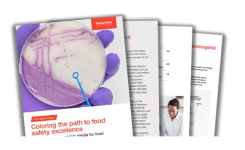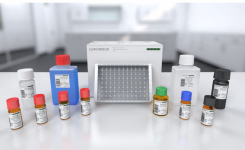Need for Drug Resistance Screening in H.pylori
go back to news archives| A recently published study about the use of the Hain Lifescience Genotype HelicoDR has highlighted its importance for the detection of resistance mutations in Helicobacter pylori. H.pylori is a bacterium that affects patients protective barriers against stomach acids. Prolonged, untreated infections can lead to stomach ulceration and in some cases (approximately 1% of infections) to gastric cancer. Drug resistance associated with H.pylori is becoming an increasing problem worldwide. Global resistance to clarithromycin is estimated between 40-50% of cases (this can increase to as much as 80% in patients who have previously been treated). The study by Cambau et al details the need for better surveillance of drug resistance by the use of a molecular assay. The paper concluded 'GenoType HelicoDR is efficient at detecting mutations predictive of antibiotic resistance in H. pylori when applied to strains or directly to gastric biopsy specimens.' The Hain Lifescience Genotype HelicoDR is a simple to use, rapid molecular assay that simultaneously detects H.pylori and key resistance markers for clarithromycin and fluoroquinolones. The test offers a cost effective solution to ensuring that patients are provided with appropriate and effective therapy. For full details on the study 'Evaluation of a New Test, GenoType HelicoDR, for Molecular Detection of Antibiotic Resistance in Helicobacter pylori' by Cambau et al, please click here For details on the Hain Lifescience HelicoDR, please click here |
NOTE: This item is from our 'historic' database and
may contain information which is not up to date.
Source : Mast Group Ltd. View Company Information
Posted on November 3, 2009
LATEST MICROBIOLOGY NEWS
-
AOAC Validated iQ-Check Vibrio PCR Kit
01 Apr 2025 -
AI-Powered Precision For Colony Counting
27 Mar 2025
MICROBIOLOGY EVENTS
-
Mycotoxin Detection and Analysis: Strategies to Support Your Testing Program
3 Apr 2025 -
15th Conference of The World Mycotoxin Forum® – WMFmeetsSalzburg
7 Apr 2025 -
ESCMID European Congress of Clinical Microbiology and Infectious Diseases
11 Apr 2025 -
IBQC 2025
14 Apr 2025 -
IFU Technical Workshop 2025
15 Apr 2025 -
Validation of Water Systems for Microbial Control
23 Apr 2025 -
USP Chapter <86> and the Move to Recombinant Methods
29 Apr 2025 -
Free Expert Webinar: Advancing Drinking Water Microbiology Testing Compliance & Efficiency
29 Apr 2025 -
British Society For Microbial Technology 40th Anniversary Microbiology Conference
15 May 2025 -
Sampling and Microbial Testing of Water and Data Trending
20 May 2025
















